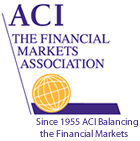
The Financial Markets Association, ACI, announced today it is backing the international proposal for reforms in the way benchmarks for foreign currency rates are set. The proposal is a direct response and part of a backlash to the exposed manipulation of some of the central benchmarks. The ACI is the trade group for wholesale financial market professionals. It currently has more than 13,000 members from more than 60 countries, and is considered by most regulators to be the most complete of the codes of conduct for the FX market. Members of ACI are engaged in trading, broking, operations, regulatory and compliance activities in foreign exchange, money fixed income and derivatives markets.
In July, the Financial Stability Board (FSB), the regulatory task force for the the Group of Twenty Finance Ministers and Central Bank Governors (G20), proposed a fundamental overhaul of the system in a public paper. The major interest reference rates (such as LIBOR and EURIBOR) are widely used in the global system as benchmarks for a broad range of financial products and contracts. The cases of attempted market manipulation and false reporting of reference rates have undermined confidence in the reliability and robustness of existing interbank benchmark interest rates. The FSB warned that the uncertainty surrounding the integrity of these reference rates represents a potentially serious source of vulnerability and systemic risk. Against this background, the G20 asked the FSB to undertake a fundamental review of major interest rate benchmarks and develop plans for reform to ensure that interest rate benchmarks are robust. The FSB will present its plans to reform the Forex market at a summit in November where G20 leaders are expected to endorse it.
Official Industry Reaction:
Marshall Bailey, President, ACI, commented on the FSB reform proposal: "The ACI welcomes the opportunity to engage with the FSB on this subject. The ACI believes that the debate about the role of benchmarks and the use of benchmarks in the FX market is a positive development, and should take place in a public forum. The benefits of transparency on the debate are numerous, and include the need for the public to understand the complexity of the creation, use and monitoring of benchmarks. The greater awareness that comes from this knowledge will assist the industry in ensuring that best practices are followed. Only if individuals take responsibility for their actions can improvements in technical processes ensure markets function appropriately. It is through excellence in education, and wide dissemination of common conduct guidance that benchmarking practices can deliver value to participants and clients."
Adopting a Universal Code of Conduct
The ACI is firmly of the belief that its Model Code should be adopted formally by the industry on both the “Buy-Side ” and the “sell-side” and applied across the globe.
As is stated by the FSB Consultative Document, for codes of conduct to be effective they must be adhered to. Participants are seeking clarity on the definitions of acceptable behaviours, which can vary by organisation, country or region. As such, the use of a single, globally recognised, industry-wide, unbiased code that addresses the specific issues of the foreign exchange market will provide a tremendous amount of value to this problem.
This adoption must be global and formally recognized across the industry, and should work currently, taking place to further harmonise the various codes of conduct that would be very helpful in reducing the risk of ethical arbitrage, and in fostering a functioning market.
The harmonisation should reflect the work done by the ACI Committee for Professionalism, and extend the work already done in the Central Bankers’ FX Committee’s “Global Preamble” placing high value on the ACI Model Code.
Support for Stronger Internal Controls
The ACI fully agrees with the FSB's recommendation that banks establish and enforce their internal guidelines and procedures for collecting and executing fixing orders.
While company and national/regional guidelines may sit alongside a global code, there should be few (if any) differences in the application of these guidelines on market practice, as any differences increase the risk of ethical arbitrage among market participants, and could give rise to the issues that the FSB Consultative Document is seeking to eradicate.
Support for Industry-Led Initiatives
Any new global or central utility (such as CCPs) that improves market efficiency and transparency is always welcome. To date, there have been tremendous benefits derived from the use of industry-backed initiatives, such as credit risk mitigation from CLS and the STP transparency benefits from CCPs. This demonstrates what the industry and regulators can achieve by working together and coordinating their efforts globally.
It is important that we strengthen oversight in the global foreign exchange market with a balanced, effective and co-ordinated approach which avoids the unintended consequences.
While the market’s structure is broadly very effective and well designed, we have a duty to the global financial system to ensure we repair where needed. A coordinated international response is the right approach, as regional initiatives or rules could drive trading institutions away to less stringent jurisdictions.






















